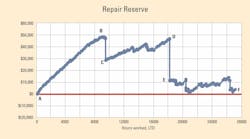When buying a piece of construction equipment, most managers consider whether they want to purchase extended warranty. Key questions need to be asked—and answered—before making your decision, but unfortunately, it’s not simple.
Let’s review the basics of standard warranty. The standard warranty is from the original equipment manufacturer, the OEM, and not from the dealer. The dealer administers the warranty on behalf of the OEM. For most equipment, the warranty follows the machine for the usual standard warranty period, 12 months from initial delivery. Some OEMs put an hour limit on the warranty, and others are unlimited. If the machine moves during the 12 months, the warranty travels with the machine from the selling OEM dealer to the nearest authorized OEM dealer.
Extended warranties always cost more than a standard warranty; somebody is going to pay to cover the additional risk.
Warranty specifically covers only “material defects and workmanship” in a normal-use application. It does not cover design- or user-caused damage, such as accidents, acts of God, operator abuse, or misapplication. It usually covers repairs at the nearest authorized dealer; if the work is done by the dealer on your job site, you can expect to be billed for mechanic travel time and mileage.
Warranties vary by OEM. Some cover expendables such as oil and filters. Loaners or free replacement machines are not usually included in warranties. The emission system has its own unique federally mandated warranty.
Extended warranty is more restrictive. First, it has a limit on time and meter hours. Second, it may be a full bumper-to-bumper warranty, an engine-only warranty, a power train warranty, or a power train plus hydraulics warranty. Most dealers sell extended warranties supported by the OEM, but some dealers choose to sell extended warranties underwritten by third-party suppliers. Some OEMs will not provide extended warranties on used machines or a machine from a rental fleet. Extended warranties always cost more than a standard warranty; somebody is going to pay to cover the additional risk.
As a company, think through these points and decide what extended warranties are valuable to you.
• Do you or your company usually self perform your own equipment repairs? If you work in a remote location, you may have backup, spare equipment, and your own shop. Mining and aggregate firms and highly mobile pipeline contractors tend to be more self-sufficient. Most general contractors and municipalities rely on their local dealers.
• How capable is your own shop? Many general contractors find the new equipment to be quite technical. For example, they may adopt a strategy to work on their owned machines manufactured prior to 2007, but outsource repairs on units after 2007. If you will outsource the repairs, extended warranties make more sense.
• What is your position on emission systems? Whether you are buying Tier 4-Interim or -Final engines, you are now acquiring more complex power trains. Diesel particulate filters, exhaust gas recirculation, and selective catalytic reduction (with separate diesel exhaust fluids) now add new technologies. Who do you want to cover these systems after the five-year/3,000-hour warranty expires?
• How do you deal with downtime on critical equipment? Downtime on machines such as large plant wheel loaders or asphalt-paving machines can cause huge delays. Negotiating an extended warranty on these kinds of units with a loaner provision (example: after being down 48 hours) is a way to minimize downtime.
• Have you looked at actual extended warranties costs? Each OEM or third-party insurer has their own cost structure. You may find their extended warranty rate reasonable up to 6,000 hours but expensive beyond 6,000 hours. Compare their costs against your known operating cost with your own use applications and preventive maintenance program.
The longer you plan to run your owned equipment, the more likely you are to acquire extended warranties. Think about it.
